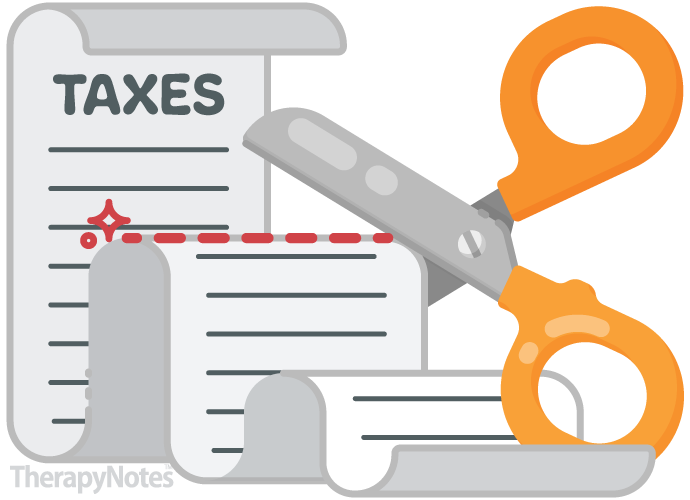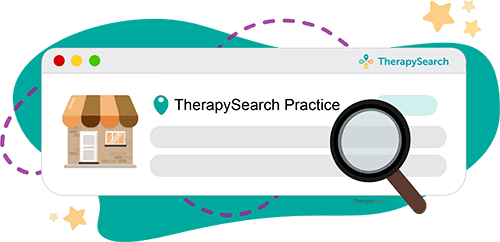How to Maximize Tax Write-Offs for Therapists
By Sarita Gulati on November 24, 2021

As a therapist, keeping track of your finances can bring up a lot of difficult feelings. It may feel like your practice’s financials are hanging over your head. You might be dealing with a full caseload of clients, pinching pennies trying to figure out how to best market yourself or feel lost overall at the idea of getting your financial books in order. After all, you didn’t become a therapist to spend all of your time worrying about money or taxes.
Despite this, feelings of uncertainty or anxiety around your business finances are completely normal. Your graduate program never talked about how to file your taxes, much less calculate your deductions or tax write-offs. So, how do you make your finances work for you and feel more secure in propelling your practice to financial success? This is where it can be helpful to utilize an accounting company to assist with bookkeeping and managing your taxes. Services like these can come in to take care of your books, relieve stress around your finances, and empower you to feel successful when filing your taxes and managing your practice.
One of the key financial hacks for a therapist, or anyone running their own business, is mastering the art of the tax deduction. At first glance it can seem overwhelming, but learning how to use tax deductions to your advantage can save you a lot of money in the process, ultimately setting you and your therapy practice up for the utmost success.
What are tax deductions?
Anything with the word tax in it can draw up a bit of fear, but tax deductions or write-offs are actually an extremely advantageous part of the tax process! Tax deductions are ultimately deductions to your taxes that come from business-related expenses. You are able to subtract or “write off” certain expenses from your income, and then are taxed on the remainder of your income as your standard income tax. The terms “tax deduction” and “tax write-off” can be used interchangeably.
It’s important to note that, as amazing and helpful as they can be, tax deductions must come only from expenses that are directly related to your business. (No personal expenses allowed!)
Common expenses and tax write-offs for therapists
Whether you have a solo practice or group practice, there are many expenses you can incur when running your own therapy business. Whether you’re attending workshops, have your own office or travel for work, you might be making a variety of payments over the course of the year that you’ll then be able to count as tax deductible.
Some of the most common opportunities for tax write-offs for therapists and mental health professionals include:
- Office (and Home Office) Expenses. As telehealth continues to grow, therapists have spent more and more on home office supplies and desk set-ups than ever before. Office expenses are eligible for write-offs as they are, of course, helping you to run your business! This can include anything from pens, scissors, staplers, and postage to cleaning supplies and small furniture or décor.
- Marketing and Advertising. How much money are you spending to market yourself per year? Marketing costs can be written off as a tax deduction and include anything used to promote yourself. Sometimes this looks like paid search or Google ad spending for your practice, but it can also be something more tangible such as print advertisements and business cards. Costs for your website and domain name can be included here too, as both contribute to your ability to market your own business!
- Office Rent and Utilities. Are you running your practice from an office? Your rent, along with utilities such as a phone or electric bill, can typically be written off. If you’re currently working out of your home or your utilities are only partially used for business use, you’ll only be able to deduct a percentage of your business usage. In the latter case, we recommend working directly with your financial advisor or accountant to determine what kind of write-off is best for you.
- Membership Fees. As a therapist, you may pay dues to a variety of organizations and groups, such as the American Psychological Association. This is a great way to stay connected with other therapists, learn about continuing education opportunities, or utilize further therapy resources around any specialty you may be interested in.
- Legal and Professional Fees. Any fees charged by accounting services are considered tax deductible! Using bookkeeping and tax platforms, like Heard which is specifically designed for therapists and mental health practitioners, can work with you directly to manage your private practice finances, and would be considered a professional fee or expense. This category can also include any lawyers, consultants, or other professionals you work with.
- Travel Expenses. Travel can be costly, so this is an important write-off to pay attention to. Tax deductions from travel must always be used for business purposes and require that you are away from your residential city for at least 24 hours. (For instance, road tripping for a client session an hour north of your home wouldn’t count.) Costs that can be written off include your mileage, meals and parking.
- Business Meals. Whether you’re getting coffee or a meal with a coworker, client, or consultant, you can write these costs off. However, these must be business related! Personal meal expenses don’t count solely because you are running a business.
- Bank Fees. Bank fees can be few and far between, but they do add up after a while. You can write off expenses for checking or savings account fees, interest, or credit card processing fees from your taxes.
- Software Services. Many different software services are required to run a business! That means as a practice management software with opportunities for billing, note taking, calendar scheduling and more, TherapyNotes® is a great example of a write-off expense. You may also use additional software to run your practice, such as Google Drive for document sharing, iCloud for storage, or Gusto for paying contractors. These can all be deducted from your taxes at the end of the year.
- Continuing Education. A common practice among mental health practitioners is continuing your education. Therapists are always looking to learn and grow in their practices, attending courses, workshops and conferences to improve their skills. Any continuing education expenses you rack up can be written off from your taxes, saving you a lot of money and giving you more bang for your buck!
- Business Registration and Licensure Fees. If you’re new to private practice, writing off your start-up costs, such as registration and fees for licensure, can be a game changer. You won’t be able to write off your initial license, but any time you are required to renew it, it can be classified as a tax deduction.
- Personal Psychotherapy. Money spent on personal sessions also has the potential to be deducted on your tax return; sessions ultimately contribute to your mental health and empower you to learn and grow in your profession. Be sure to check with your financial advisor for their best recommendation around this deduction, as accountants and advisors are often split between whether this can become a write-off.
- Depreciation expenses. Depreciation expenses can be a tricky subject, but they’re important to understand as they can offer you a hefty write-off come tax season! For something to qualify as a “depreciation expense”, it must be a larger-scale purchase over $2,500. For those in therapy and mental healthcare, one of the most common depreciation expenses is office furniture. (You’ve got to keep your clients comfy somehow, right?) You can choose to deduct depreciating purchases from your taxes in the first year after purchase, or in small increments over the years the item is used.
Should I work with a finance or tax professional?
Tax deductions can definitely come in handy and save you lots of dollars in the long run, and with the above list, you’re ready to tackle them. But while these categories provide a solid overview of write-offs that will benefit your business, your deductions can vary based on your business entity and personal situation. The above categories are a quick sample of how you or your bookkeeping service can organize your books. This way, you can pay attention to where your cash is going and how best to maximize it come tax season. When the end of the fiscal year rolls around, all of your practice’s business expenses will be in one place and you’ll be all the better for it.
* The content of this post is intended to serve as general advice and information. It is not to be taken as legal advice and may not account for all rules and regulations in every jurisdiction. For legal advice, please contact an attorney.

About Sarita Gulati
Get more content like this, delivered right to your inbox. Subscribe to our newsletter.
More Content You'll Enjoy

Converting Clients

What's New: Introducing Practice Profiles in TherapySearch!
